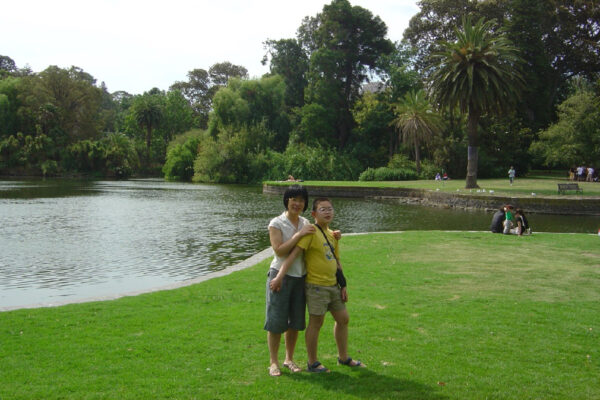
‘Like an Animal’: Mother Describes 700 Days Detained in a Chinese Labor Camp Over Her Faith
Rita Li
Almost two decades ago, Wang Ying was sentenced to two years of forced labor for doing nothing more than carrying two books in her luggage on a train home.
“Show me your ticket. … Which is your luggage?” A steward approached Wang on the morning of Oct. 3, 2002, trying to find out her identity. It was the cross-legged sitting posture of her companion that aroused the steward’s suspicion.
The officer ended up finding two Falun Gong books—millions of which had already been burned or trashed on orders from the Chinese Communist Party (CCP).
Falun Gong, also known as Falun Dafa, is a spiritual practice that originated in China, involving five slow-moving exercises including a sitting meditation and moral teachings based on the principles of truthfulness, compassion, and tolerance.
It was practiced by 70-100 million adherents in China by 1999, official estimates at the time found, but later brutally suppressed by the Chinese regime which felt threatened by its growing popularity. Since July 1999, millions have been detained inside prisons, labor camps, and other facilities, according to the Falun Dafa Information Center.
Wang, a university teacher who had practiced Falun Gong since 1996, was forced to leave her Beijing home and her young son in 2001, after authorities threatened to send her to a brainwashing center.
Having not seen her child for over a year, Wang decided to reunite with her family in Beijing. However, local police arrested and detained her immediately after the train arrived in the city.
After that, Wang’s four-year-old son was told, “Mom’s on a business trip.” But it was still hard for him to understand why his playmates in the kindergarten could be picked up by their mothers after school, but he only had grandparents, said Wang, who now resides in Australia, in an interview with The Epoch Times.
“When I came back [after being released from prison], my child, he followed me everywhere I went, but he did not call ‘mom,’ not a word,” she recalled.
“He was no longer used to doing so.”

‘Not Even a Human’
Wang was separated from her loved ones for more than 700 days. The time crawled by for Wang during detention. “You’re not even a human. You are like an animal,” she said.
On Nov. 23, 2002, after Wang’s sentencing, she was escorted to the dispatch department from the detention center, where inmates would stay before being sent to different labor camps. Upon arrival, she was forced to squat facing the wall for an extended period of time and subject to a full humiliating search by prison guards.
“Before the meal, you have to sing a song to thank the communist party, then take a bowl and squat, waiting to be served,” she said.
“While walking, you have to keep your head down and walk along the side wall, not in the middle. This is their rule.”
When walking past guards, detainees had to stop and say, “Greetings, captain.”
https://www.theepochtimes.com/like-an-animal-mother-describes-700-days-detained-in-a-chinese-labor-camp-over-her-faith_3766945.html
“There was a time I forgot to stop. I was punished to kneel on the floor and copy the camp rules on a small iron bench,” Wang said.
Paid a Cent a Day
In January 2003, she was sent to Beijing Women’s Labor Camp.
Built in October 1999, Beijing Women’s Labor Camp detained only 100-200 people, mainly drug addicts and prostitutes by July 2000. But in the aftermath of the persecution of Falun Gong, the number soared to nearly 1,500 by 2002. Six of a total of seven units were dedicated to persecuting Falun Gong, according to Minghui, a U.S.-based website documenting the persecution.
For months, Wang was forced to work from 6 a.m. to 9 p.m most days to knit by hand exports including gloves, sweaters, and hats. Sometimes she wasn’t allowed to sleep until finishing the work.
These orders were placed by Chinese companies, who subcontracted labor camps at a low price to make substantial profits.
It took Wang a whole day to knit a pair of gloves. The compensation, however, was negligible—only one cent ($0.0015) per pair.
“The government pays you,” a camp officer told her. “You should be grateful. We could pay you nothing.”
After her release in August 2004, Wang received a message from the camp telling her to come and collect the unpaid salary: 10 cents ($0.015) in total.
On top of making cheap goods, all prisoners, regardless of age, had to do a required amount of farm work, including building greenhouses, clearing uncultivated farmland, weeding, and fertilizing.
Usually, inmates had no hot water for washing, but only a wet towel to clean the body. Wang was allowed to take a shower once every one or two months.
Wang said she was able to persevere through her physical pain by holding on to her faith.
Psychological Torment
It was the endless mental torment, rather than physical exertion, that drove Wang to the brink. “Break you down and thus [force you to] give it up. That’s their purpose—to ‘transform’ you,” she said.
A term coined by the CCP, “transformation” entails coercing Falun Gong practitioners to give up their belief through threats, torments, and brainwashing. Many detained adherents have been forced to write “transformation” statements to renounce their beliefs.
A labor camp leader who manages to “transform” a large number of practitioners will be honored as a “model worker,” a designation directly linked with bonuses and promotion opportunities, according to Wang.
To achieve a “100 percent transformation rate,” the labor camp aims to destroy adherents’ faith by crushing their spirits.
When she first came to the camp, Wang was not allowed to sleep for over a week.
She was forced to sit motionless on a small stool in a prison cell for 24 hours a day, while a prisoner stood watch. “The only time I could stand up was when I went to the bathroom under the surveillance of a guard,” Wang said.
Once a victim’s willpower has been drained, practitioners would be forced to sign the so-called “three statements” to renounce their faith—a guarantee statement, a repentance statement, and a severance statement.
Yet that’s far from the end. ”You think it is over, but it’s just started,” Wang said.
She ended up signing the statements, which started a whole new process called “reeducation.”
During “reeducation,” practitioners were forced to attend brainwashing sessions, watch propaganda videos, write “thought reports” reflecting their states of mind, and mentally sever their relationship with Falun Gong and its founder by publicly exposing and criticizing—which were videotaped for use in future CCP propaganda.
“To curse and slander [your belief] over and over again caused the most suffering [among the detainees],” Wang said, adding that she witnessed many practitioners suffer mental disorders as a result.
‘Spiritual Death’
Wang’s experience opened her eyes to the tragedy that befalls someone when they are forced to betray their conscience.
She said that “spiritual death” is fatal for human beings.
Many practitioners who “converted” were forced to lie and even beat fellow practitioners in order to prove that they had completely renounced Falun Gong.
“The harsher you cursed, the better you were ‘transformed,’” Wang said.
The purpose of this cruelty was to “tear a person apart spiritually,” she said. “You know [the practice] is good, but you are forced to lie against your heart.”
In the end, some people end up becoming “two-faced,” according to Wang.
She believes that mental disassociation could result as a consequence of spiritual desolation.

Wang fled to Australia with her son on Jan. 26, 2008.
The first time she joined group exercise with local Falun Gong practitioners in an outdoor garden, she was moved to tears. “I wouldn’t see it at all [in mainland China],” said Wang.
“My child has become outgoing,” Wang said, smiling. “He was really fond of his new school uniforms.”
